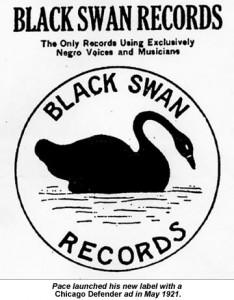To avoid any misunderstanding : the title is not my opinion but the one of music critic Ray Kornblum in 1922 when he pronounced himself on the new phenomenon of race records that had started in the beginning of the 20s.
In order to fully grasp the depth and significance of a past event, it is most essential that one tries to have a full view of the complete context in which this event took place. That is why I found it so illuminating to stumble upon some material which quoted from the reactions that were heard when the first black music was recorded in the 20s. We can only understand the extent to which inviting a black artist to a recording studio in 1920 was a real revolutionary act if we read the cultural environment in which this took place. At the late 1910s record companies were so proud on their product that they could announce and advertise how “a caravan can step under the Pyramids for lunch and can turn on to the “Beautiful Ohio”, and how great an invention it was that thanks to the genius of the companies an Eskimo mother could put her baby to sleep with American music.
Just imagine what a shock it must have been to find all of a sudden that this white bastion would record African American music that was sold in American stores! What a revolution it was for America to sell ethnic, black music!
Blues was not a new music genre that was taken for granted. The Race Records were seen as a blot on the industry. The 78 Quarterly 1989, vol 1 (n°’ 4) further quotes Ray Kornblum in the Milwaukee Journal:
“It’s a completely different world. The singing is terrible, the music is junk; its suits their tastes”.
Two years later, the Talking Machine Journal was no less categorical in its opinion on the black music:
“…() hundreds of race singers have flooded the market with what is generally regarded as the worst contribution to the cause of good music ever inflicted on the public. The lyrics of a great many of these blues are worse than the lowest sort of doggerel and the melodies are lacking of originality, lilting rhythm and any semblance to music worth”.
It couldn’t better illustrate how negatively blues was perceived by the mainstream music circles.

The only thing that could be stronger than a cultural disapproval of the ‘new’ music, was the economic impulse that money could be made. It has to be credited to the guts of the white CEO of Paramount Records (Mr Supper) that he dared to leap into the black music market, based only on the success that Okeh had with Mamie Smith’s “Crazy Blues”, and on some marginal recordings that had been issued on the ‘Black Swan”-label (sometimes called America’s First Motown). It was pure speculation from Supper’s side and completely against his general company policy that there needed to exist evidence of a potential market before a new product was released.
As a matter of fact, we need to thank Mr Supper for his speculative action and risk taking behaviour! But as I said in an earlier post, he didn’t have much other options than this for survival.
(Source : 78 Quarterly, vol. 1, n°4, 1989, p. 11)

